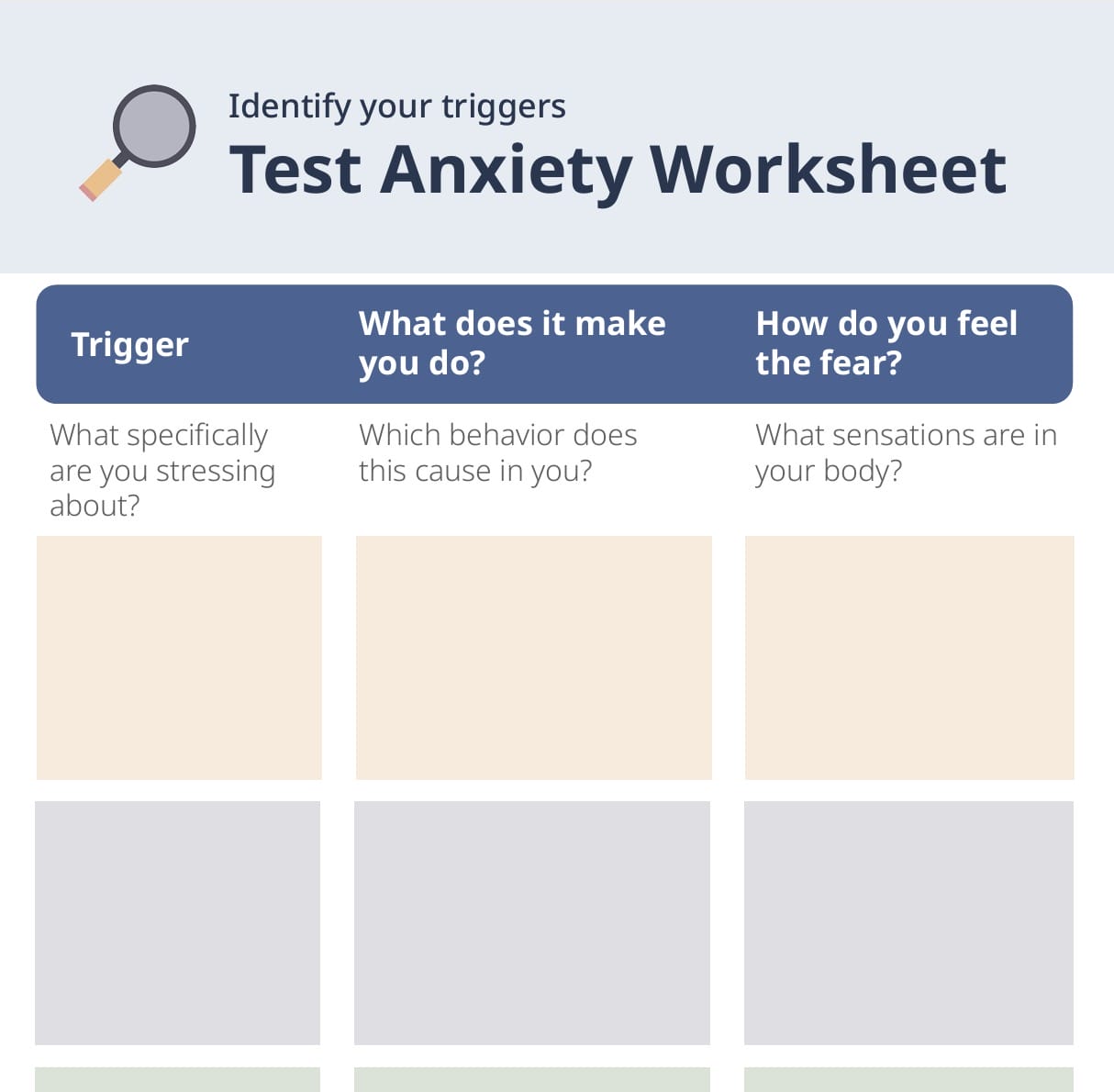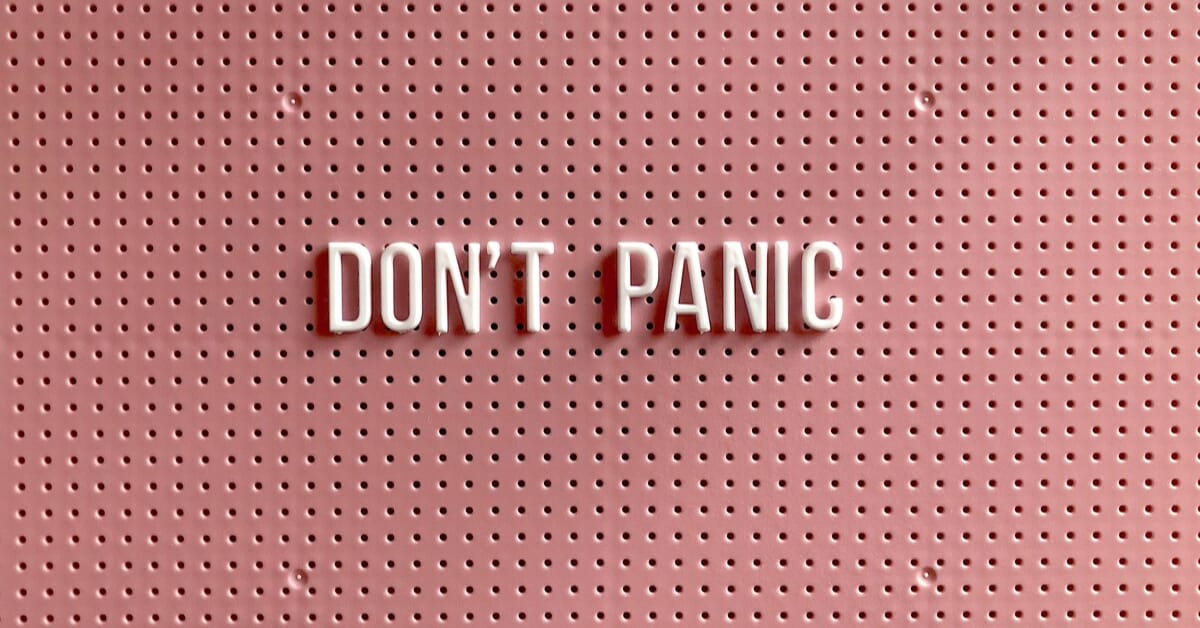What causes test anxiety?
The fear of failure
Test anxiety (or “exam fear”) usually stems from the fear of failure. You can be afraid of failing regardless of your past experiences:
- Maybe you have never failed anything and get more afraid with each test you pass.
- Maybe, since you were a child, you’ve tied your self-worth to your performance.
- Maybe you have failed a test before that you were sure you aced.
Whatever the reason – a lot of students know the crippling fear of not living up to expectations and simply not being able to succeed.
Healthcare education can be daunting
Medical and nursing school can be particularly anxiety-inducing since they are an entirely different ballgame from what you may have experienced before:
- Study habits that got you through school or college suddenly don’t cut it anymore.
- You might have been among the best your entire life, and suddenly the competition is much stronger.
- You may have breezed through schooling before, but now feel like you’re trying to drink out of a water hose with how much information is thrown at you.
A lot of students feel unprepared and end up in a state of freezing when faced with the much higher pressure, workload, and complexity due to fear and overwhelm, especially in high-stakes test situations.
Nervousness, test anxiety, and exam phobia
While a certain degree of nervousness before an exam is normal, if the fear is severe enough to keep you from focusing and applying your knowledge and skills in a test situation, it can become a serious issue blocking your success.
Some people experience an extreme form of test anxiety, called exam phobia. This is when the fear gets debilitating and completely keeps them from getting through and performing in test situations. Many who struggle with this will avoid test situations by postponing exams, or simply not showing up. Of course, this can seriously affect one’s studies and it is worth seeking professional help.
So, what now?
We want to state one thing here: You’re not alone in this, it’s not you, and being afraid does not mean you’re not cut out for your dream career path.
It is much more likely that you have not yet mastered a tool set that works for you and sets you up with the confidence in your own abilities that you need to calmly tackle an exam.
Healthcare courses demand more than average study habits that might have sufficed in earlier educational settings. This isn’t a reflection of your capabilities but rather the nature of the beast—healthcare training is tough! Success in healthcare exams requires not just hard work but also smart work. This includes adopting:
- Advanced productivity tools
- Solid time management strategies
- Study techniques specifically tailored to manage the voluminous and complex material.
Below, we will go over additional measures that are helpful to specifically tackle test anxiety, set you up with better coping abilities, and help you bring your best to the table on test day.
Strategies to alleviate test anxiety
#1 Practice anxiety relief techniques
Tried and true anxiety relief techniques can be extremely useful for immediate relief in the moment, but become more effective if they are practiced regularly. Well-known examples you could try include progressive muscle relaxation, breathing techniques, meditation, thinking positively, pointing out items around you to remind you that you are safe, and more. Everyone is different and it is definitely worth trying out which ones work best for you.
#2 Remember your “why,” and how far you’ve come
“Medicine is a calling, not a profession.” – Going into the healthcare field, you probably are a driven individual who had their own personal motivation why you chose this difficult path. Remember your ultimate goal, why did you want to do this in the first place? Then, understand that it is a scary path but it leads you where you want to be. If you can accept anxiety as a part of this path, it becomes a necessary challenge on your way to reaching your goal, one more thing to conquer, rather than a struggle you feel like should not happen.
#3 Fix your time management
This can be learned! You’re not either just bad or good at it, this is a skill you can practice over time. Just like cramming doesn’t work as well as continuously studying, keeping up good time management techniques over time will make things easier, not trying to follow a rigid schedule directly before an exam when you’re otherwise not used to it. Our brains like routine!
It’s a marathon, not a sprint.
Here are some starting points to help you assess and improve your time management:
- Avoid procrastination: Tackle tasks in small, manageable steps to prevent last-minute rushes which can spike stress levels.
- Establish routines: Consistency in your study schedule builds habits that make prolonged focus easier.
- Limit distractions: Be deliberate about your use of social media and other distractions. Time spent browsing can often be better used revising or resting.
#4 Take care of yourself
We all know the drill: exercise, sleep, social relationships, good nutrition, routine. We know it, and yet it is hard to prioritize taking care of yourself when the stressors pile up. But: making time for this is what helps you perform your best.
Keeping things in perspective e.g. with journaling, regularly checking in with yourself can help you monitor your health and emotions and address negative changes early on.
The more stable you are overall, the more you can feel able to take on a high-stakes challenge.

Free download: test anxiety worksheet
Download the PDF and take time for yourself to understand your stressors better!
#5 Don’t run away from your feelings
For a lot of us, when we experience negative emotions, our first instinct is to suppress them or distract ourselves. Especially if you feel like you should not be nervous or feel shame around your nervousness, it can be hard to accept the feeling. While distraction can sometimes save you from anxiety spirals, it is often more helpful to be aware of your emotions not just in your mind, but to actually feel them in your body. Tools like progressive muscle relaxation can tackle anxiety on a physical level, and movement can help you get tension out. Dogs shake to get rid of stress – and it’s not a terrible idea for humans to try either!
#6 Look for support – and be careful what you let in
Study groups and exchanging worries with your study peers – BUT it’s easy to get sucked into other people’s anxiety spirals. Focus on yourself when you need to. Turn to family and friends for distraction and support and to remind yourself that this upcoming exam is not the only thing that matters in your life. If exam fear significantly impacts your academic life, talking to a therapist might be worth a try!
#7 Come prepared and become a master planner
Walking into exam day feeling you’ve been thrown into a situation you’re not prepared for is a reliable recipe for anxiety. Come prepared! Have a test-taking strategy in place (like approaches to specific question types, answering simpler questions first), practice the test conditions beforehand, and prepare checklists for organizational to dos around the exam early on – stressing over organizational things you could have researched and taken care of beforehand only adds to your anxiety on test day.
Arrive early, read the tasks carefully, and make sure the actual exam contents are all you need to worry about on test day.
Conclusion
Don’t let exam anxiety keep you from reaching your goals. By understanding its roots and employing strategies to build resilience and manage time, you can significantly alleviate your stress. This post collects strategies you can try to address exam anxiety – but that being said, if the test anxiety controls much of your academic life and hinders your performance, consider seeking help from a professional.
Remember, each exam is a stepping stone, not just a challenge.
With the right tools and mindset, you can approach them with confidence and calm, ready to succeed.




